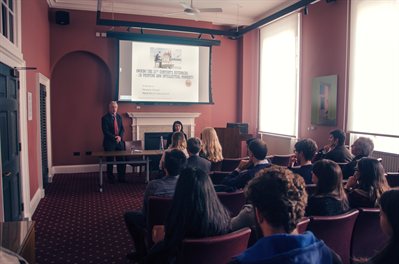3D Printing and Intellectual Property
 Dr Phoebe Li from the University of Sussex gave a talk about her rich experience and involvement in 3D printing, followed by a question and answer session.
Dr Phoebe Li from the University of Sussex gave a talk about her rich experience and involvement in 3D printing, followed by a question and answer session.
In the course of a seminar, the Centre for Technology, Ethics, Law in Society (TELOS) at King’s has recently drawn attention to a new technology, which is capable of changing our everyday life fundamentally and in various ways: Under the title 'Owning the 21st Century's Gutenberg - 3D Printing and Intellectual Property', Dr Phoebe Li from the University of Sussex gave a talk about her rich experience and involvement in 3D printing, followed by a question and answer session.
Dr Li holds a Master of Law in Science and Technology from the National Tsing Hua University, a PhD from Edinburgh University, and is currently developing an interdisciplinary project with the Law and Engineering departments of Exeter University about the relationship between 3D printing and intellectual property law. The well-attended seminar, organised by TELOS under the guidance of Professor Kevin Madders, hereby recommenced the approach of the King’s network to turn the spotlight on cutting-edge research and topics, to foster exchange and discuss arising questions.
'3D printing is nothing less than the new industrial revolution': Dr Phoebe Li had no problems to enthuse her audience with this new technology and the relevance of her topic. The application areas of 3D printing the speaker thereafter introduced proved this evaluation at the outset most impressively. Not only cars, houses and guns have already been successfully produced by 3D printers,but also chocolate, meat and even hearts and livers have proceeded as subjects of 3D printing and the results are considered as striking. As a consequence, Dr Li predicted major impacts to several industries, such as construction or the health system. Chances and risks need to be weighted in every single aspect of the new technology, but within the next decade 3D printing products are expected to enter the market in various areas. Consequently, Dr Li considered a greater extent of commitment by the state as desirable. Currently, many projects are rather funded by private sources but this new technology was just too promising for the state to stay out of it. Big regulatory challenges are also to be expected for the law. Regarding intellectual property issues, Dr Li emphasised that 3D printing was basically another new way of reproduction and could thereby be addressed by the existing legal bodies. When it comes to printing guns or liability questions for printed houses or organs, legislative institutions are in demand to balance the risks fairly and to relieve the contractual level by providing a functioning legislative scheme.
The seminar closed with a reception, which allowed the attendees to digest their thoughts and to discuss individual impressions furthermore. After this successful session, TELOS is already focussing on new events and will announce details shortly.
(Text written by Sonja Heitzer, photo by Muhammed Furkan Akıncı)